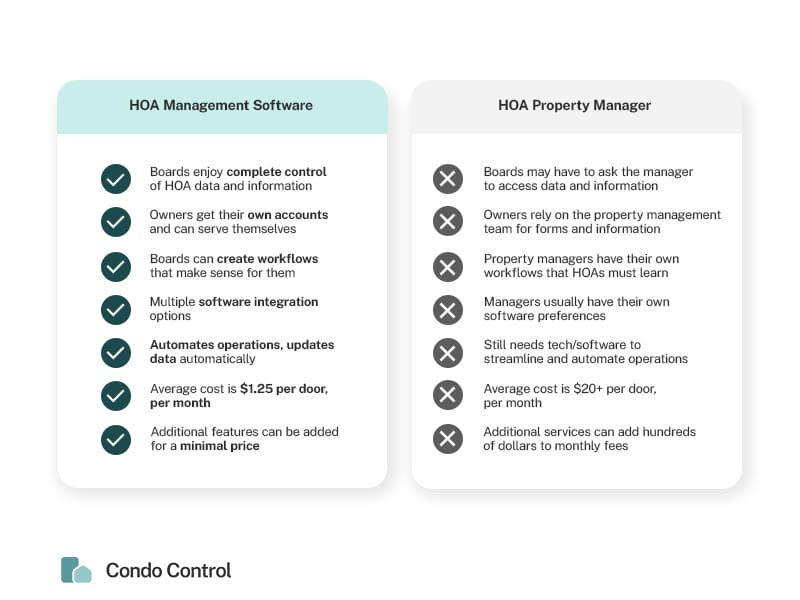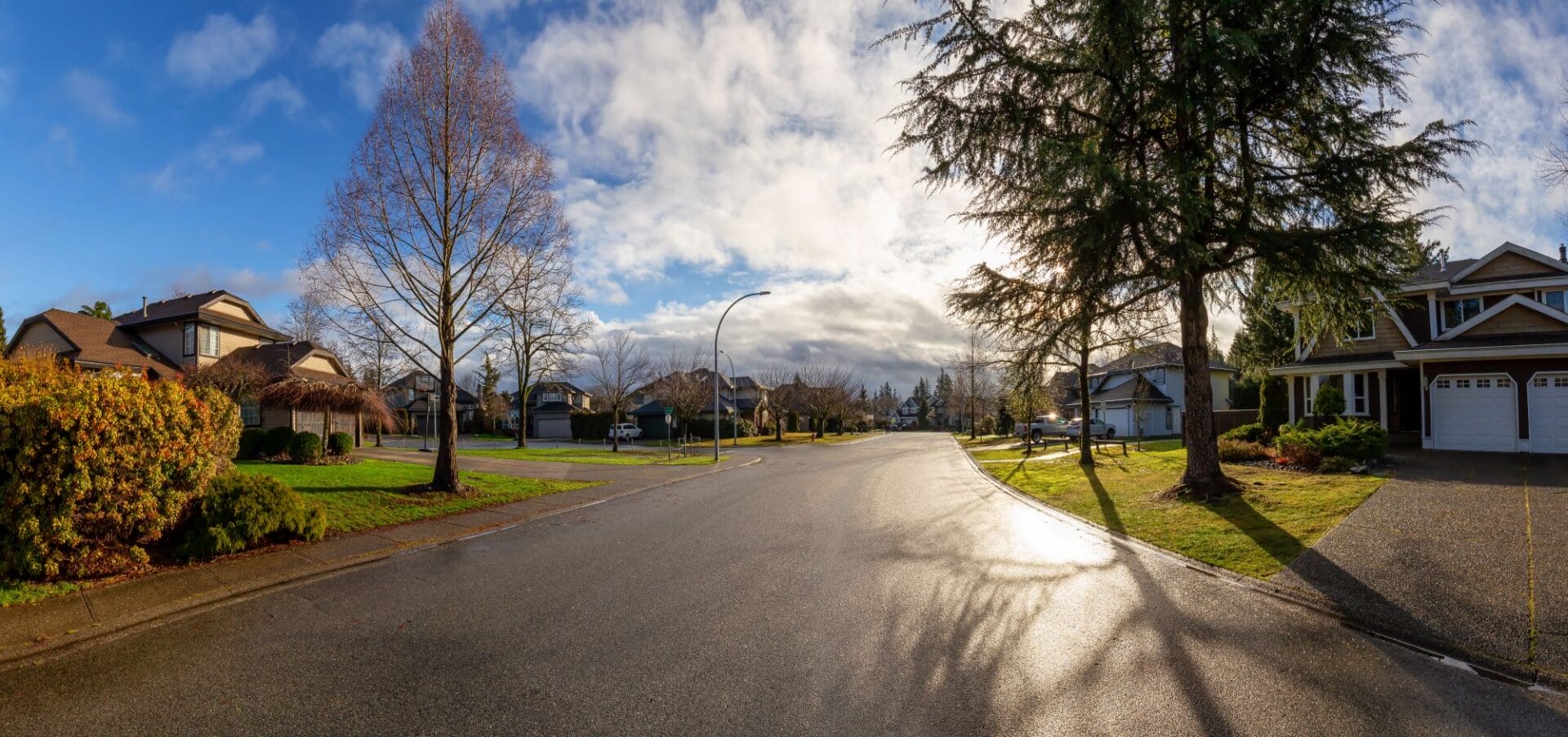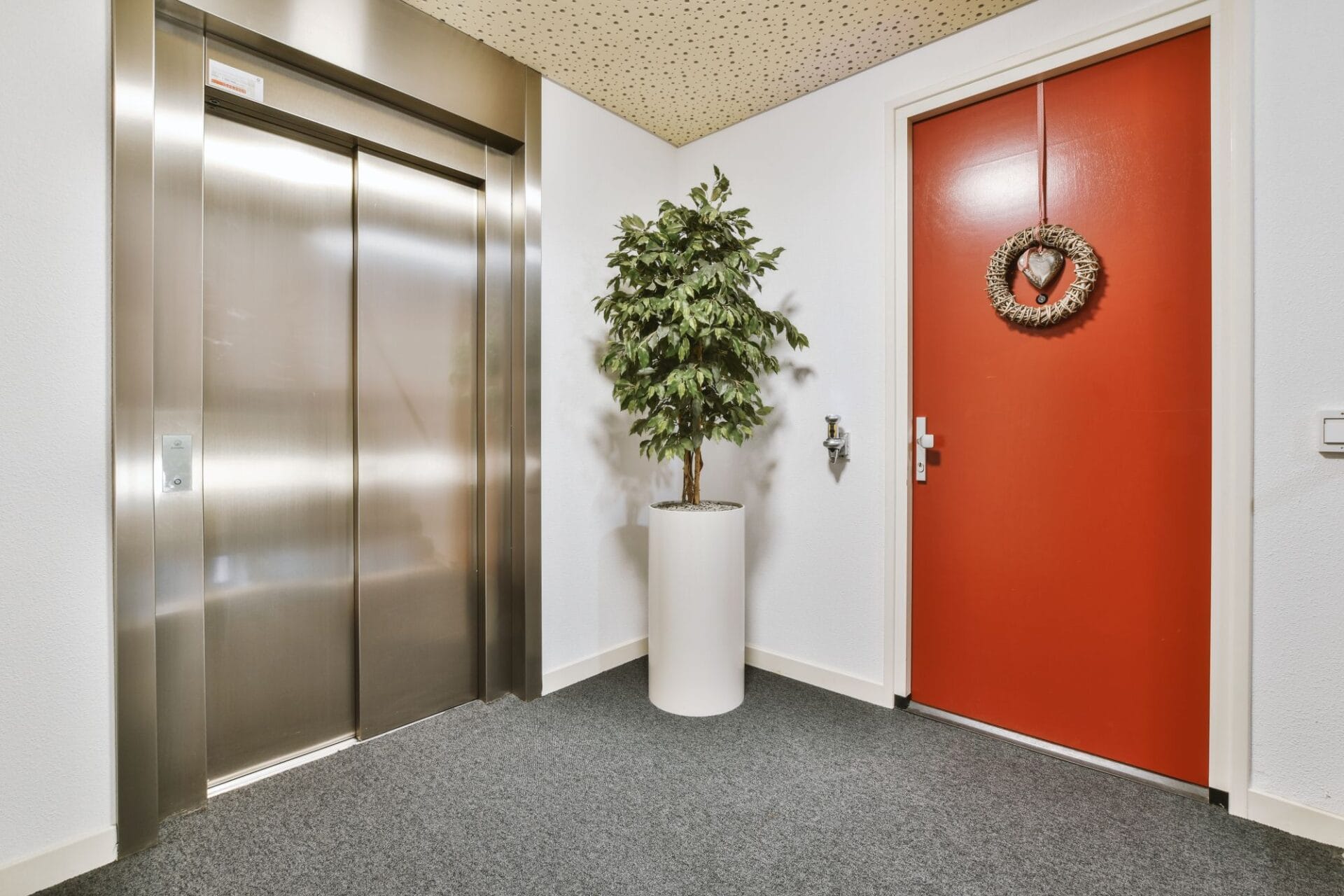Managing a community is hard work. It takes countless hours, dozens of volunteers, and thousands of cups of coffee (or tea).
HOAs often hire management companies to help them with daily operations. Professional management companies have the skills and experience required to improve operational efficiencies and reduce costs. They also give board members more time to focus on long-term planning and goals.
However, the cost of hiring a property management company has increased, mainly due to economic conditions and labor shortages. This increase has led some communities to consider self-management.
Table of contents
- What does it mean to be a self-managed community?
- Board members are still in charge, even if there is a property management team
- Pros of self-managing an HOA with software
- Pros of hiring a management company
- Cons of self-managing an HOA with software
- Cons of hiring a management company
- Examples of successful self-managed HOAs
- Tips for running a self-managed HOA
- What’s the best solution?
What does it mean to be a self-managed community?
A self-managed HOA relies on voluntary services from its residents and members. The board members oversee the community, but other HOA members are needed to operate committees.
When HOAs can work well together, a self-managed arrangement can certainly be successful. However, self-managing an HOA, especially a large one, requires a lot of time and effort. Fortunately, HOA management software can take on a heavy workload. A software like Condo Control is more than capable of streamlining payments, organizing bookings, improving communications, producing reports, and much more. Best of all, it costs a lot less for an annual software subscription than it does for a team of property management professionals.
Read on to see if self-management is a viable possibility for your HOA.
Board members are still in charge, even if there is a property management team
It’s worth noting that boards still have a fiduciary duty to act in the best interest of the community.
Board members are, by law, required to be responsible and act in good faith. So, even with help from a property management team, it’s still the board’s responsibility to ensure there is enough money in the reserve funds, rules are being enforced, meetings take place, etc.
Pros of self-managing an HOA with software
These are the main reasons why HOAs decide to self-manage their communities using HOA management software.
Low annual costs
The most common reason why boards decide to self-manage their communities is to save money. The cost of software varies depending on the size of the community, the length of the contract and the features offered, but practically any subscription will be significantly less than what a property management company charges.
On average, HOA software subscriptions cost $1.25 per month, per door, but again, that price can vary depending on several factors.
Total control over community data
When the board pays for a software subscription, the association has complete control over it. Not only does this allow board members to access all community data at any time, but there is no uncertainty about what happens to that data when the next set of board members is elected.
Conversely, when a property management company brings its own software to a community, there are questions about what happens to the data if the relationship between the HOA and the management company ends. Often, the information does not stay with the HOA.
Owners get their own accounts and can serve themselves
HOA software is for everyone, including members who do not serve on the board. They get their own accounts, and will have barrier-free access to self-service tools like online payments, a library for community documents, maintenance requests, amenity bookings, and more.

More convenience
Software can work 24/7. That means an owner can submit a form after 6 pm, and they can do it from the comfort of their home. Similarly, board members can use the platform to approve invoices or vote on HOA business without having to physically be in the same room.
Operations are automated, data is automatically updated
Many manual processes have been improved through HOA management software. For example, it’s possible to log, issue and resolve violations using a computer or phone. Owners who receive digital violation notices can respond to the violation, and even make a payment if a fine is also issued.
The violations dashboard is updated automatically and shows the admin user how many violations are past due, how many active violations there are, and how many violations have been created in the past month. All of this data helps the HOA keep track of issues, and even take steps to reduce common violations.
Additional features can be added at a minimal cost
Condo Control’s HOA software is customizable, meaning communities can add additional features as they need them. Fees for these extra tools are very reasonable.
Pros of hiring a management company
These are the main reasons why HOAs decide to hire a professional management company.
Lighter workload
Property managers act as agents of the HOA board. They take on many day-to-day activities so that the board can focus on “big picture items.” Property managers can do a lot for a community; from resolving owner disputes to updating budgets, it’s hard to believe they can accomplish so much in just one day.
More competitive vendor rates
Property managers have strong relationships with reputable vendors. Since they help contractors find clients, the vendors often provide discounted rates.
Help with finances
Most of us would panic if we were asked to manage a multi-million dollar budget on behalf of an entire community, but that’s what board members have to do. Having help from a professional can be incredibly reassuring to board members. Managers help prevent costly mistakes from occurring, and they can even make suggestions to improve spending or budgeting.
Professional experience
HOA managers are not lawyers or accountants, but most do have experience helping HOAs with lawsuits, taxes, insurance, and other complicated matters. They can also help keep HOAs compliant, and out of legal trouble.
Better communication with owners
Inevitably, owners will have questions that only a human can answer. A property manager can get those answers for owners in a few days or less. It could take much longer to get answers from a board that is responsible for managing the entire community on its own.
Keeping owners informed is an important part of community management. Informed owners can make better decisions, and are more likely to get involved by participating in meetings and other events.

Cons of self-managing an HOA with software
These are the downsides to self-managing an HOA with software.
Heavier workload
Even with software, a self-managed HOA is still responsible for a lot of tasks. There are some things that software simply cannot do.
Harder to secure top vendors
A self-managed HOA won’t have the same negotiating power as a property management company when it comes to securing vendors for projects.
The association may not get its first choice, or it will need to pay a higher rate to get the services it wants.
Responsible for finances
Self-managed HOAs are on their own when it comes to crunching numbers and creating budgets. Community finances must be handled correctly, otherwise, the financial health of the HOA could be jeopardized. Boards may decide to hire a bookkeeper and accountant if no one has experience with financial management.
More volunteers are needed
Self-managed HOAs will need volunteers to serve on committees. Depending on the size of the HOA, there might be five or six committees to help manage requests, finances, social events, amenities, violations, etc.
Cons of hiring a management company
These are the downsides to hiring an HOA management company.
High annual costs
Good help doesn’t come for free. HOAs can expect to pay anywhere from $25,000 a year in management fees if the community is small, to over $80,000 a year if the HOA is large.
Management companies generally charge based on the number of doors served. A midsized community could expect to pay $20 to $40 per door per month, but that price could be higher depending on the extent of the services and other factors. Large communities may receive a discounted rate.
Less control of data and information
Boards will have to ask the manager for some community data or reports. It is a minor inconvenience, but it is frustrating having to wait for that information, especially if it is needed to make an important decision.
Property managers still need tech or software to automate tasks
Property managers take care of several properties at the same time. They have to make the most of their time, and probably use software to maximize efficiencies.
The cost of the software will be passed on to the HOAs they manage, meaning the association is paying for a product that it does not own.
Hard to switch companies
If the HOA decides that the management company is not the right fit, it will have to endure a lengthy and disruptive process to switch companies. The association may even have to pay a large sum of money if the contract is terminated early.
Examples of successful self-managed HOAs
Learn how these two self-managed communities used Condo Control to improve efficiencies and reduce costs.
Condo Control made it possible for this HOA to successfully self-manage, and save money.

This snowbird community can connect with owners and manage information with ease thanks to Condo Control.

Tips for running a self-managed HOA
If your HOA does decide that self-management is the best option, apply a few of these strategies to ensure the transition is a success.
Choose a comprehensive HOA software platform
Every HOA software platform is a little bit different. Some cater to larger communities while others specialize in accounting and financial management.
Take time to research your options and find the platform that is most capable of addressing your HOA’s needs.
Look for a software that is scalable and backed by a team of people who can offer reliable customer support. Even the best software solutions won’t be any good to you if you can’t figure out how to use them.
Make sure to encourage owners to use the platform
The more owners use the HOA software, the less they’ll need from you. It’s worth taking the time to help owners feel comfortable using the software so that they can serve themselves. Plus, the HOA has already paid for their account, so they might as well use it.
Work as a team
Every person on the board should act with the understanding that they need to have a professional attitude at all times.
Board members do not have to agree on every issue, but they must prioritize the HOA’s best interests. Members should be willing to help each other, and other community members, in order to maintain the health and happiness of the association.
Remember that you can’t please everyone
Disputes are bound to happen in any neighborhood. It’s nearly impossible to make everyone happy since different owners will have different goals and values.
Try to maintain a professional demeanor when dealing with unhappy owners. Remind them of why certain rules or processes exist, but don’t be tempted to cater to their individual wants. Self-managed HOAs simply don’t have the resources to meet every owner’s demands.
Hire professionals when necessary
There will be situations where a self-managed HOA requires help from a professional. Whether it’s finances, legal matters or architectural issues, never hesitate to seek professional advice when a problem is too complex for the board to solve.
Paying an expert is almost always less expensive than the cost of a lawsuit or special assessment.
So, what’s the best solution?
In a perfect world, every HOA could afford to have HOA management software and a property manager. Some communities are mostly self-managed, but have a paid part-time office manager to look after bookkeeping and administrative tasks.
However, your HOA should do what makes the most sense for it. While hiring a property management company is more expensive, some communities cannot manage on their own.























